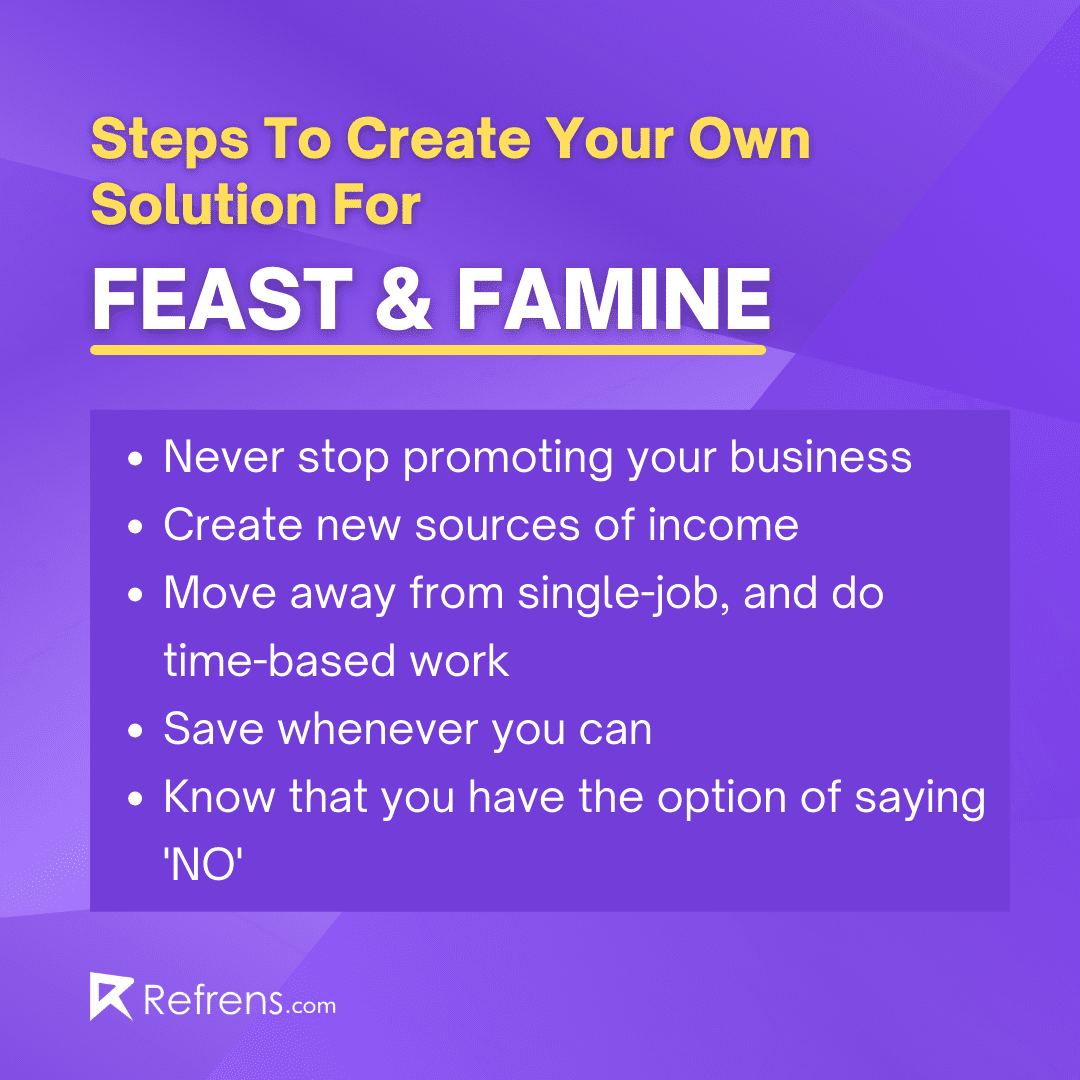Whether you’re a freelancer or considering a freelancer career, the feast and famine cycle can be a regular part of the job.
The feast and famine cycle is an up-and-down roller coaster where you’re joyful and “feasting” at times, and hungry and needing labor at other times.
It’s normal to have a few slow months during the year, but there are a few things you can do to try to be more consistent and break the cycle.
Thus, One of the most common worries among freelancers, particularly newcomers, is how to prevent the revenue of the feast and famine cycle.
What Is The Feast And Famine Cycle?
The feast and famine cycle refers to whether you’re loaded with client work or don’t have enough to do as a freelancer.
Many freelancers despise the pattern of being overburdened. When a big volume of work comes in at once, with deadlines piled on top of deadlines, get so stressed that they can only focus on client work.
The feast and famine cycle is the polar opposite of a regular income.
As it isn’t unavoidable; Only until you stop that loop.
That’s because you won’t be able to prepare forward if you don’t have control of your company. You can’t predict anything because the only thing you know for sure is that there will be greater ambiguity.
As a result, you eagerly anticipate the next feast. It’s more like putting your life on the line in a high-stress game of roulette.
Let’s understand it better with an illustration.
Let’s assume you earn $8,000 in January—that’s fantastic! You met your financial and revenue targets, added new clients, and yet have a lot of work ahead of you. So, that’s how you spend the month of February. You take cover and get down to business.
However, by the time February closes and March arrives, you have no fresh leads because you were preoccupied with client work. You barely made $5,000 in February because it was a slow month.
Hence, it’s important to prevent and learn ways of handling the feast and famine cycle.
Impact Of Covid On Freelancers
The COVID-19 epidemic has created significant disruption in our working lives, and it is likely to transform the way we work in the long run.
Moreover, the crisis may hasten several already-established labor trends, such as automation and digitization, greater demand for contractors and gig workers, and increased remote work.
COVID-19 has not only put millions of people out of work, but the types of jobs that emerge from this crisis are unlikely to be the same as those that were lost.
According to research, a platform for business consultants and highly-skilled flexible talent are on-demand skills. Freelance wages, which had declined at the start of the worldwide pandemic, have increased in the third quarter of 2020 and returned to pre-COVID levels.
Between the first and second quarters of 2020 in India, the median fee collected by freelance consultants fell by over 25 percent, but began to recover in the third quarter, gradually returning to pre-Covid levels.
Also, Women accounted for fewer than 30 percent of new registrations and saw a 200 percent increase in the total number of freelancers joining after COVID-19.
Moreover, there are around 16 million self-employed workers among 150 million workers in the United States. They represent America’s small business owners and work for profit or fees in their own businesses. Many of them also provide jobs for other people, around 30 million in recent Covid-19 years.
Furthermore, Self-employment can be a stepping stone into the commercial world. It’s also a good alternative for people who wish to be their own boss or have more flexible work hours.
Self-employment has risen throughout COVID-19 and attracted people who have lost their jobs due to corporate downturns. It may have also been a handy choice for some parents juggling child care and employment during the coronavirus outbreak.
As a result, it’s crucial to be aware of the possibilities of the feast and famine cycle but also to devise a plan for surviving it.
Different Ways To Handle Famine
- Invest Your Feast Money Wisely
It’s easy to feel like you’ve finally made it when you’re making excellent money. You’ll never have to worry about another month with no income!
Famine can strike at any time. But, if you use your feast money carefully, you won’t be counting pennies when the famine strikes.
- Spend your famine time wisely
During the famine, you should make the most of your time by performing the following tasks:
- In search of new clients
- Checking in with existing clients for work while looking for new sources of income
- Guest blogging helps to build your portfolio.
- Checking in with existing clients for work while looking for new sources of income
- Working on your websites and blogs.
- On social media, try to expand your audience.
- Using social media to promote your work
- Do a side project
Having a side project can be beneficial. It’s not something you’re counting on for a living, but you never know.
It’s always possible that it’ll take off. A side project might keep you occupied and provide some creative comfort during downtime.
Maybe you’re working on a WordPress plugin or a custom app. It’s excellent to have side projects that you can start and quit.
- Explore and monetize from Your Niche
While you don’t have work and are ideal, now is the time to begin exploring alternative sectors that interest you, conducting research on them, and conversing with other freelancers about their prospects and pay. This will assist you in selecting a niche that would suit you and your needs.
- Set yourself apart
You must distinguish yourself from the crowd. Something that your client will always be on the lookout for, something that no one else can supply, and something that your client will wait for you to return from vacation to finish their assignment. Nothing will be able to stop you once you’ve found it and proven it with actions.
- Diversify Your Earnings
Find something else to do, regardless of your business or monetized expertise. Before you max out your credit cards, you should have other options.
If you’re a writer, for example, guest blogging could help you supplement your income when the famine strikes.
- Marketing
When things are slow, you must advertise yourself. Turn up the volume on your networking. Make contact with previous clients. Whatever it takes, do it.
But keep in mind that doing a lot of marketing when things are quiet and doing nothing when things are busy is what got you into this issue in the first place.
Avoid the urge to go on a market binge. Look for strategies to put money into your marketing now that will pay off later when you’re less busy.
Set up techniques like drip-email marketing that can bring in work while you’re engaged with client tasks for a small upfront time investment.
- Take advantage of the downtime to expand and grow your business
Use your break between clients to pick up a new talent, preferably one that you both enjoy and can be beneficial to your business. There are lots of possibilities that learning a new talent can open.
It’s easy to take on any job to make money during a famine. But, keep in mind that the work you do reflects both you as a freelancer and your company. Jobs that aren’t a good fit could push you out of your comfort zone, causing worry. Saying no is a tremendous affirmation of your self-confidence.
Going through this cycle is not easy. However, practicing these tactics will assist you in conquering famine time.
What To Do During Feast Time?
- Save money
Now is the perfect moment to start putting money aside. Don’t overspend; instead, save. Prepare an emergency reserve in case of a famine. Set aside the government’s part for taxes. Set aside a part of your savings for the next time you need it.
- Don’t stop with your marketing
You must advertise yourself when times are busy. It was marketing that got you this job in the first place. Even an hour a week can have a significant impact.
But keep in mind that doing a lot of marketing when things are quiet and doing nothing when things are busy is what got you into this issue in the first place. So go ahead and schedule that time.
- Don’t stop learning new things
Even if you have a job and are busy, you should never stop learning new things. In times of famine, improving your skills would always come in handy. Perhaps learning a new skill that fascinates you will assist you in finding more freelance opportunities.
- Ignoring your clients
You should not stop contacting your previous clients; you should keep in touch with them so that if they have work in the future, they can contact you.
You should also regularly update your skills on social media sites where you connect with your clients so that you can maintain a good post-work relationship with them.
- Trying out new platforms for leads
You should always be on the lookout for new leads from other platforms so that when your current work is over, you can go on to the next.
If you have an excessive amount of work, reach out to other freelancers to see if they can help you finish it before the deadline, and in exchange, you can offer them a part of the payment you earn, and vice versa.

Steps To Create Your Own Famine & Feast Solution

Never stop promoting your business
Even if your order book is filled, you must continue to pitch. Long times of famine for freelancers can be traced back to a lack of marketing during their previous feast era. Maintain a pitching schedule to stay in touch with existing clients while also attracting new ones.
Create new sources of income
Take a hard look at the people you serve. Consider what additional services or goods they might be interested in purchasing. Examine the obstacles and stressors they are experiencing and provide products or services to alleviate the stress. These everlasting services are an important part of breaking the famine-feast cycle.
Move away from single-job, time-based work
Freelancing is characterized by a large number of single-task, one-time jobs. Make an effort to transition your regular clients to a retainer-based payment model. This means that your income is more consistent and reliable, as well as ensuring that your consumers are aware of exactly what they are purchasing from you and can budget accordingly.
When you can, SAVE!
When you’re on a spending spree, as Stephanie suggests, attempt to spend as much money as you can. This accumulates a contingency reserve that you can use in times of scarcity. Examine your usual financial obligations to determine how much money you’ll need to save.
Keep in mind that you have the option of saying ‘NO’
It’s easy to take on any job to make money during a famine. However, keep in mind that the work you do reflects both you as a freelancer and your company. Jobs that aren’t a good fit for you may force you to step outside of your comfort zone, producing anxiety. Saying no is a powerful declaration of self-assurance.
Conclusion
It may be difficult to deal with the inconsistency of revenue that has become the norm in the freelancing world. The good news is that by adopting a few simple strategies, you may break the feast and famine cycle and begin earning a significantly more constant and reliable income while maintaining the freedoms you need as a freelancer.
Almost every freelancer gets affected by the feast and famine cycle. Yet, there are many things mentioned above that you can take to reduce the impact on your funds and sanity. Take action right now with some general strategies that can help you break free from the loop. Also, if you’re in the middle of a feast and famine cycle, take the above steps to break it.
Whether it’s feast or famine, you ought to be on the lookout for the next client or gig.
Never stop looking for freelance jobs, whether it’s on social media, at professional conferences, by email, or by creating a profile on Refrens to convert quality leads.
Refrens can help you out! Whether you’re starting out as a freelancer or are a seasoned pro. We have the most up-to-date information on reputable freelancing opportunities. Take the tour to learn how Refrens can assist you in attracting new clients.

















